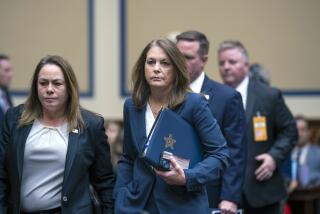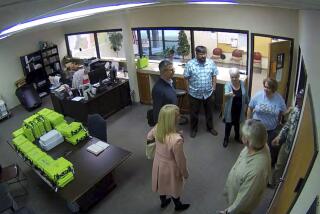Technician who deleted Clinton emails declines to answer questions from Congress

The technicians who worked on Hillary Clinton’s private email server refused to answer questions posed by House lawmakers Tuesday.
- Share via
Reporting from Washington — Two technicians who worked on Hillary Clinton’s private email server refused on Tuesday to answer questions posed by House lawmakers, citing their constitutional right to remain silent.
The men, including one who reportedly erased an archive of Clinton’s emails despite being aware of an order to preserve them, repeatedly asserted their 5th Amendment right against self-incrimination. They were excused from the hearing.
For the record:
4:04 a.m. June 12, 2025An earlier version of this article spelled the last name of Platte River Networks technician Bill Thornton as Thorton.
A third, former State Department staffer Bryan Pagliano, who played a key role in setting up the server, did not show up to testify before the House Government Oversight and Reform Committee.
Rep. Jason Chaffetz, the Republican chairman of committee, said the witnesses’ decision not to answer questions will complicate efforts to learn more about the Democratic presidential candidate’s use of the controversial private email server. He was particularly irked by Pagliano’s decision not to appear, despite having been subpoenaed.
“It’s not optional,” Chaffetz said.
Pagliano’s lawyers, led by Mark MacDougall, sent a letter to Chaffetz on Monday, saying their client has repeatedly asserted his 5th Amendment rights before Congress and doing so again “serves no legislative purpose and is a transparent effort to publicly harass and humiliate” the former staffer.
Rep. Elijah Cummings, the committee’s ranking Democrat, defended the decision of the technicians and Pagliano to assert their right to remain silent, saying, “This committee is abusing taxpayer dollars and the authority of Congress in an astonishing onslaught of political attacks to damage Secretary Clinton’s campaign.” He and other Democrats have long accused House Republicans of using their investigative powers as a political attack against Clinton.
The two technicians, Paul Combetta and Bill Thornton, work for Platte River Networks, a private company based in Colorado that started managing the server in 2013.
Combetta told FBI agents that when the use of the server became public in March 2015, he realized he had not deleted an archive of emails on Platte River’s server as directed by a Clinton aide four months earlier. He then deleted the files using a software program known as BleachBit, which later complicated efforts to recover the data, according to an FBI report and a source familiar with its findings.
Combetta, who Cummings said was granted limited immunity by the Justice Department for his cooperation in the probe, told the FBI he was aware of a congressional order to preserve documents but had not received any specific guidance about it.
Clinton and her aides told the FBI they were unaware that Combetta had deleted emails in March 2015.
The FBI and Justice Department concluded there was no evidence that Clinton or her aides deliberately tried to conceal or delete work-related emails that should have been turned over to authorities.
Justin Cooper, a former employee of Bill Clinton and the Clinton Foundation, helped set up and run the server from 2009 through 2013 in the basement of the Clintons’ home in New York. He also appeared before the committee and answered questions posed by lawmakers in line with what he previously had told the FBI, according to the bureau’s report.
Election 2016 | Live coverage on Trail Guide | Sign up for the newsletter
The hearing is the latest in a string of proceedings seeking to examine Clinton’s email practices since the Justice Department in July declined to press criminal charges against her.
FBI agents and federal prosecutors spent nearly a year investigating whether Clinton violated laws governing the protection of classified material by using her private email system while serving as the nation’s top diplomat.
In July, FBI Director James Comey said that agents found 113 emails that contained classified information in at least 52 chains. Eight email chains had top secret information at the time they were sent, he said.
A subsequent FBI report, which was released publicly Sept. 2, revised the figures upward. The FBI and intelligence community determined that classified information was in 193 emails that were part of 81 email chains. Of those chains, eight contained top secret information, the highest level of classification. Thirty-seven chains had information containing secret information, and 36 had material deemed confidential, the lowest level of classification.
Comey called Clinton’s handling of classified material “extremely careless” but said she did not violate any laws because she did not knowingly or willfully mishandle sensitive information.
Clinton has said she decided to use the private email account for both work and personal business as a matter of convenience.
Twitter: @delwilber
ALSO
Obama, breaking from his busy day job, is campaigning again for Hillary Clinton
Hillary Clinton has millennials’ support, and now she’s trying to make sure they vote
Democratic and Republican voters are further apart than they’ve been in a generation. Here’s why
UPDATES:
12:45 p.m.: The article was updated with additional background.
The article was originally published at 9:35 a.m.
More to Read
Sign up for Essential California
The most important California stories and recommendations in your inbox every morning.
You may occasionally receive promotional content from the Los Angeles Times.














